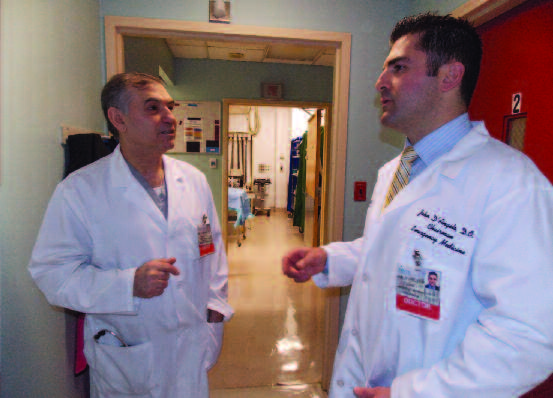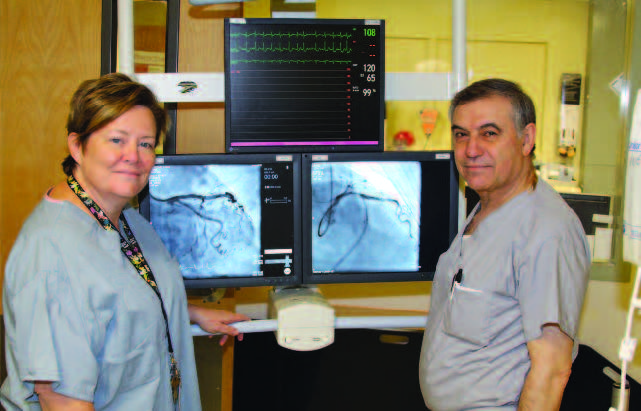As a rule, and often out of necessity, interventional cardiologists are as cool and detached as they come. Fayez Shamoon is the exception that proves the rule.
By Jennifer L. Nelson
How frail the human heart must be. When Sylvia Plath penned those words she could hardly have anticipated the work of Dr. Fayez Shamoon, the newly appointed Medical Director of Cardiovascular Services at Trinitas Regional Medical Center. Whether performing a heart-valve replacement procedure, or springing into action to save a patient’s life after suffering a heart attack, Dr. Shamoon blends world-class technical skill in interventional cardiology with a level of personal involvement which, for decades, has set him apart from his peers.
“Cardiology is a fascinating, procedure-oriented field,” he says, “but it’s the time I spend with patients that I find most rewarding. Once you do something for them, you can just tell how much they appreciate it.”
Learning Curve
Although he keeps himself busy consulting with patients and providing life-saving cardiac procedures, Dr. Shamoon remains committed to the pursuit of education. Along with co-authoring some 50 peer-reviewed articles, he actively participates in clinical trials and studies to do his part to advance the field of cardiac care. He is currently the Program Director of the General Cardiology Fellowship and Interventional Fellowship programs at Seton Hall University’s School of Health and Medical Science. Since graduating from medical school, he has shared his knowledge at a range of academic institutions in various capacities. “One of the most enjoyable parts of what I do is interacting with residents and fellows,” he says. “I’m a teacher by nature, and never believed I belonged in private practice.”

Dr. Fayez Shamoon, Director of Cardiovascular Services (left) confers with Dr. John D’Angelo, Chairman of the Department of Emergency Medicine, about the life-saving potential of field as-sessments of patients suffering heart attacks caused by blocked arteries, known as STEMI.
That’s the easy part of the job, Dr. Shamoon insists. In an environment where technology and procedure are ever-changing, he must remain laser-focused on the latest surgical practices and treatments. “Cardiology is such a progressive, high-tech field…and there are so many advances in the pipeline,” he says. “It’s very exciting.”
Among Dr. Shamoon’s proudest moments as a cardiologist are when he succeeds in keeping a patient out of the operating room; his expertise in the latest cardiac procedures can often spare patients from traditional open-heart surgery. While on-site at Trinitas, he can almost always be found in the Cardiac Catheterization Lab. When a patient is suffering from a heart attack, Dr. Shamoon is among the first on call. Every minute counts (with 90 minutes of arrival being the industry-accepted maximum), and the team at Trinitas routinely cuts 15 to 20 minutes off its “door-to-balloon” time — significantly improving the success rate of a life-saving angioplasty procedure. Trinitas remains one of the only medical centers in New Jersey to provide a direct line to cardiac care by allowing patients experiencing an ST segment elevation myocardial infarction (STEMI)—in layman’s terms a heart attack caused by a blocked coronary artery—to bypass the emergency room and head straight for the cardiac unit. “This is really my major work,” Dr. Shamoon explains.

Janice Learn, RN, Director of the Cardiac Catheterization Labora-tory, works closely with Dr. Shamoon in caring for patients who undergo elective and emergency cardiac procedures at Trinitas.
Dr. Shamoon also makes himself available to perform an array of clinical procedures—including aortic valve replacements where patients may need him in other institutions in Northern New Jersey. One of his specialties is a cutting-edge technique that allows surgeons to replace a heart valve through a catheter inserted into a small incision in a patient’s groin, ultimately sparing them from open-heart surgery. “They wake up the next day and it’s like nothing ever happened,” he smiles.
Dr. Shamoon received his medical degree and training overseas at the University of Jordan and Jordan University Hospital. He spent years as an ER physician at hospitals in Northern New Jersey and then established a private practice in North Arlington in the late 1990s. But, the cardiologist has always felt the tug of the community. Now in Elizabeth, he has planted himself firmly in the realm of hospital care, where his breadth of experience can benefit the widest possible audience.
“Trinitas is truly a community hospital, and I pride myself on being able to provide a real service for the region,” he says. “When patients need me, I can offer my skills to them right where they live.”
Editor’s Note: You can contact Dr. Shamoon in his office at (908) 994-5333.





